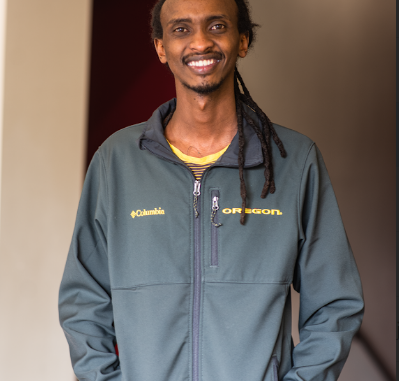
Student dedicates himself to mental health crisis after Rwandan Genocide, provides healing space for kids
International student Rene Pacifique Amani, who goes by his last name, is a Rwandan citizen studying at Lewis & Clark this year. He is here on the Roméo Dallaire scholarship, a program that allows recipients to enroll in the Academic English Studies program at Lewis & Clark College for one academic year.
The scholarship honors the work and vision of Roméo Dallaire, former commander of the United Nations Peacekeeping Mission to Rwanda. Amani has come with the aim to improve his English and raise funding for his very own non-profit, which aims to help his country mentally recover from the aftermath of the Rwandan genocide.
Once a biomedical engineer by profession, Amani left his high-paying job to start his own nonprofit organization in Rwanda called One Help One Direction Ihumure (OHODI). The effort was inspired by witnessing the plight of children on the streets of Rwanda while walking back and forth to his university.
The Rwandan Genocide was a mass killing of around 800,000 people in 1994, one of the deadliest in modern history. It was a coordinated campaign carried out by members of the Hutu ethnic majority against the Tutsi minority and moderate Hutu politicians. The international community failed to intervene and left Rwanda in a state of chaos.
According to Amani, Rwanda is facing a mental health crisis caused by the trauma of the genocide. While the country has made significant strides in economic and political recovery, the effects of trauma remain a silent illness that affects everyone in the community. Poverty is often assumed to be the root cause of the childhood homelessness Amani witnessed, but he argues that the lasting trauma is the real culprit.
“(The people of Rwanda) make money, they have food, they have the basic needs, but their kids are on the street,” Amani said. “It’s not because of money. It’s because of this trauma.”
Amani explains the root cause is a perpetuated cycle of mental health neglect. Most adults in Rwanda witnessed the atrocities of the genocide in their youth, creating deep psychological trauma that has been left largely unaddressed. They grew up and raised children and directly transmitted their trauma. Amani states that most children are on the street because of hostile house environments and a lack of a loving home. While most were fortunate enough to be born after the tragedy, they are still heavily impacted by the fallout. Amani fears that without intervention and help, this cycle of trauma will just continue.
Amani’s organization addresses this by providing a safe space for children to be, express their feelings and play. Amani uses Trust-Based Relational Intervention (TBRI), a trauma-informed approach for his work with the children. TBRI is an attachment-based approach to caring for children who have experienced trauma, abuse, neglect or other forms of distress.
The holistic approach focuses on meeting children’s physical, emotional, and relational needs to help them heal and thrive. TBRI gives children who have experienced trauma a safe and secure environment to feel understood and supported. That healing can occur through the development of positive and nurturing relationships with caregivers.
Amani explains that before he became educated in TBRI, his instinct when dealing with troublesome children would be to send them home. Afterward, however, the children were still rude, aggressive or difficult. Amani now understands this negative behavior differently.
“The behavior of the kids is not the kid. That’s different,” Amani said. “I see the need behind the behavior.”
The programming provided by OHODI is only part of the solution. According to Amani, since the larger issue of children living on the streets is a consequence of intergenerational trauma, breaking the cycle of trauma requires creating a nurturing environment for both children and parents. Amani realizes that the lack of oversight and concern from parents is the root factor that leads children to the streets, ande believes that educating and working with children is not enough. Parents need to be included in the programming.
He begins by asking parents when was the last time they told their children that they loved them or gave them a hug. These questions are often met with surprise, as Amani said this type of affection is not commonplace in Rwanda.
Amani has big dreams for his organization. He wants to expand his facilities and resources for the community and also hopes to make his organization large enough to find government backing. He believes that, much like how the government has paid for infrastructure to aid the financial crisis caused by the genocide, it should provide funding to help Rwandans mentally heal as well.
Currently, OHODI does not receive public funding and relies on the community to survive. With the limited amount of funds the organization is currently receiving, the majority of the money goes to just paying rent for the facility. Due to these challenges, the organization is raising the funds to build its own trauma-informed center in order to sustain its projects and impact as many Rwandans as possible.
According to Amani, by working together, we can change the lives of those who need it most.You can visit OHODI’s website to learn more about their work and make a donation through their Gofundme.
“Your heart could become a home for hopeless souls,” Amani said.
Subscribe to the Mossy Log Newsletter
Stay up to date with the goings-on at Lewis & Clark! Get the top stories or your favorite section delivered to your inbox whenever we release a new issue.

Leave a Reply